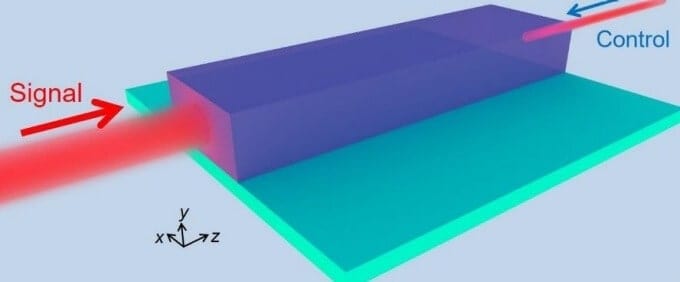It’s a paradox that has long vexed researchers in the field of optics.
To control a light source, another light source that uses as much energy — if not more — is often required. The setup works, but it’s not efficient.
A new study reports that researchers have demonstrated a way to control light with light using one third — in some cases, even less — of the energy typically required. The advancement, coupled with other developments, could ultimately lead to more powerful, energy-efficient computer chips and other optics-based technologies.
“Typically, symmetry connotes harmony and beauty. But not in this case. We’ve developed technology — an asymmetric metawaveguide — that enables a weak control laser beam to manipulate a much more intense laser signal,” says Liang Feng, assistant professor in the Department of Electrical Engineering, School of Engineering and Applied Sciences, and the study’s lead author.
The study — “Metawaveguide for Asymmetric Interferometric Light-Light Switching” — was published Oct. 31 in the journal Physical Review Letters. It was co-authored by researchers at California Institute of Technology and the City University of New York.
The study reports that the metawaveguide — a tiny rectangular box made of silicon, the semiconducting material for computer chips — creates asymmetric reflections of the two beams of light, which enables the weaker beam to control the other beam.
The research was supported by grants from the U.S. Army Research Office, the National Science Foundation and Boeing.
If our reporting has informed or inspired you, please consider making a donation. Every contribution, no matter the size, empowers us to continue delivering accurate, engaging, and trustworthy science and medical news. Independent journalism requires time, effort, and resources—your support ensures we can keep uncovering the stories that matter most to you.
Join us in making knowledge accessible and impactful. Thank you for standing with us!

